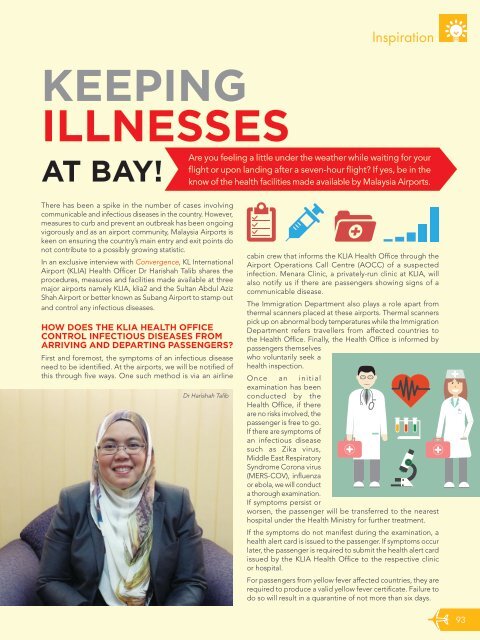CONVERGENCE NOVEMBER - DECEMBER 2016
Create successful ePaper yourself
Turn your PDF publications into a flip-book with our unique Google optimized e-Paper software.
Inspiration<br />
KEEPING<br />
ILLNESSES<br />
AT BAY!<br />
Are you feeling a little under the weather while waiting for your<br />
flight or upon landing after a seven-hour flight? If yes, be in the<br />
know of the health facilities made available by Malaysia Airports.<br />
There has been a spike in the number of cases involving<br />
communicable and infectious diseases in the country. However,<br />
measures to curb and prevent an outbreak has been ongoing<br />
vigorously and as an airport community, Malaysia Airports is<br />
keen on ensuring the country’s main entry and exit points do<br />
not contribute to a possibly growing statistic.<br />
In an exclusive interview with Convergence, KL International<br />
Airport (KLIA) Health Officer Dr Harishah Talib shares the<br />
procedures, measures and facilities made available at three<br />
major airports namely KLIA, klia2 and the Sultan Abdul Aziz<br />
Shah Airport or better known as Subang Airport to stamp out<br />
and control any infectious diseases.<br />
HOW DOES THE KLIA HEALTH OFFICE<br />
CONTROL INFECTIOUS DISEASES FROM<br />
ARRIVING AND DEPARTING PASSENGERS?<br />
First and foremost, the symptoms of an infectious disease<br />
need to be identified. At the airports, we will be notified of<br />
this through five ways. One such method is via an airline<br />
Dr Harishah Talib<br />
cabin crew that informs the KLIA Health Office through the<br />
Airport Operations Call Centre (AOCC) of a suspected<br />
infection. Menara Clinic, a privately-run clinic at KLIA, will<br />
also notify us if there are passengers showing signs of a<br />
communicable disease.<br />
The Immigration Department also plays a role apart from<br />
thermal scanners placed at these airports. Thermal scanners<br />
pick up on abnormal body temperatures while the Immigration<br />
Department refers travellers from affected countries to<br />
the Health Office. Finally, the Health Office is informed by<br />
passengers themselves<br />
who voluntarily seek a<br />
health inspection.<br />
Once an initial<br />
examination has been<br />
conducted by the<br />
Health Office, if there<br />
are no risks involved, the<br />
passenger is free to go.<br />
If there are symptoms of<br />
an infectious disease<br />
such as Zika virus,<br />
Middle East Respiratory<br />
Syndrome Corona virus<br />
(MERS-COV), influenza<br />
or ebola, we will conduct<br />
a thorough examination.<br />
If symptoms persist or<br />
worsen, the passenger will be transferred to the nearest<br />
hospital under the Health Ministry for further treatment.<br />
If the symptoms do not manifest during the examination, a<br />
health alert card is issued to the passenger. If symptoms occur<br />
later, the passenger is required to submit the health alert card<br />
issued by the KLIA Health Office to the respective clinic<br />
or hospital.<br />
For passengers from yellow fever affected countries, they are<br />
required to produce a valid yellow fever certificate. Failure to<br />
do so will result in a quarantine of not more than six days.<br />
93

















